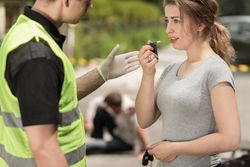
Getting pulled over for signs of impaired driving is stressful. OVI/DUI is a serious traffic violation, and it carries severe penalties in the state of Ohio. However, if you know what to expect during the police interaction, it'll be easier to move the process along smoothly.
What Happens During a OVI/DUI Traffic Stop?
1. Interrogation
After getting pulled over, you'll need to hand over your driver's license and vehicle registration documents. However, you're under no legal obligation to supply additional information. For example, if the officer asks whether you've been drinking, you have the right to remain silent to avoid incriminating yourself.
2. Breath Test
 If the police have reason to believe you're impaired, they may ask you to take a breath test. Since Ohio has an implied consent law, motorists who don't submit to BAC tests following lawful arrests could face penalties. For instance, a first-time refusal may result in a one-year administrative license suspension.
If the police have reason to believe you're impaired, they may ask you to take a breath test. Since Ohio has an implied consent law, motorists who don't submit to BAC tests following lawful arrests could face penalties. For instance, a first-time refusal may result in a one-year administrative license suspension.
3. Field Sobriety Tests
At some point during the traffic stop, the police may ask you to get out of your vehicle and perform one or more field sobriety tests (FSTs). Unlike BAC tests, FSTs aren't required by law. What's more, their results are subjective, and even drivers who are entirely sober could fail them inadvertently. Since they aren't mandatory, you have the right to refuse these tests.
If you’ve been pulled over for a DUI or other traffic stop, turn to Nichols, Speidel & Nichols for guidance. Located in Batavia, OH, this firm was founded in 1926 and they’ve been representing clients across Clermont County ever since. Backed by more than 150 years of combined experience, their legal team is equipped to help you get a positive outcome. To request a consultation, reach out on their website or call (513) 732-1420.
About the Business
Have a question? Ask the experts!
Send your question

